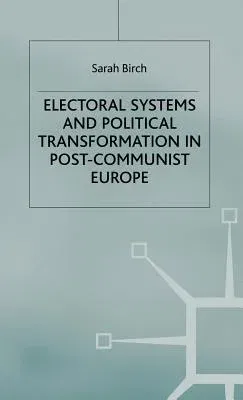S Birch
(Author)Electoral Systems and Political Transformation in Post-Communist Europe (2003)Hardcover - 2003, 25 November 2003

Qty
1
Turbo
Ships in 2 - 3 days
In Stock
Free Delivery
Cash on Delivery
15 Days
Free Returns
Secure Checkout

Part of Series
One Europe or Several?
Print Length
212 pages
Language
English
Publisher
Palgrave MacMillan
Date Published
25 Nov 2003
ISBN-10
0333987659
ISBN-13
9780333987650
Description
Product Details
Author:
Book Edition:
2003
Book Format:
Hardcover
Country of Origin:
US
Date Published:
25 November 2003
Dimensions:
22.25 x
13.77 x
1.68 cm
Genre:
Eastern Europe
ISBN-10:
0333987659
ISBN-13:
9780333987650
Language:
English
Location:
London
Pages:
212
Publisher:
Series:
Weight:
385.55 gm